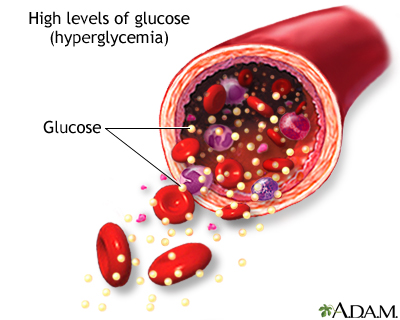| Step 1: What is diabetes? |
Diabetes is one of the most important chronic health problems of modern life. The number of people with diabetes is on the rise. Diabetes affects people’s health in several ways. For instance, diabetes increases the costs and prolongs the length of stay in about one quarter of all hospital admissions in the United States, from any cause. For reasons like this, diabetes has become the most expensive chronic illness in the country.
Diabetes is a disease that results when your body either does not make enough insulin or does not use insulin properly. Insulin is a hormone made by your pancreas to turn the food you eat (especially the sugars and starches) into the energy you need each day.
When everything is working right, here is what is supposed to happen:
- You eat, and the food is converted into sugar.
- Sugar levels in your blood start to rise.
- This signals your pancreas to provide insulin.
- Insulin "unlocks" cells throughout your body to let the sugar in.
- Your cells use this sugar for energy.
 |
When you have type 2 diabetes, body tissues, such as fat, muscle, and your liver, can't use insulin properly. This is called insulin resistance. Many people with type 2 diabetes for more than 10 years also make less insulin than their body needs.
One key to treating type 2 diabetes is to make your body tissues more sensitive to insulin.
Glucose levels in your blood
The sugar in your blood is called glucose. Insulin and glucose are partners -- both are necessary for your body to function. When insulin lets enough sugar into your cells to provide fuel for your body, the level of sugar in your blood stays safe.
If you have untreated diabetes, your cells may be starving for energy while the glucose in your blood begins to rise. The glucose can reach very high levels. Over time, high glucose levels may damage many different organs in your body. Thus, poorly controlled diabetes can lead to serious long-term health problems, including:
- Heart disease and stroke
- Kidney disease
- Eye problems
- Nerve damage
- Foot problems

Controlling diabetes
The good news is that your diabetes can be controlled, and long-term complications can be prevented or minimized. To do so, you need to learn how to keep your blood glucose levels in the safest range possible. You can accomplish this through good nutrition, reaching and maintaining a healthy weight, and exercise.
Sometimes you'll also need diabetes medicine. And it is wise to add psychological and social support to your plan from the beginning -- rather than waiting for a specific problem. Managing diabetes involves making changes in old bad habits. You’ll want all the support that you can get.
Getting the facts will help you take charge. Don't worry about learning everything at once! In time you will become an expert -- you will learn more as you go along.
To continue to the next step of this diabetes guide, click "next" below.
Reviewed By: Nancy J. Rennert, MD, Chief of Endocrinology & Diabetes, Norwalk Hospital, Associate Clinical Professor of Medicine, Yale University School of Medicine, New Haven, CT. Review provided by VeriMed Healthcare Network. Previoulsy reviewed by Ari S. Eckman, MD, Division of Endocrinology and Metabolism, Johns Hopkins School of Medicine, Baltimore, MD. Review provided by VeriMed Healthcare Network. (5/13/2010)
